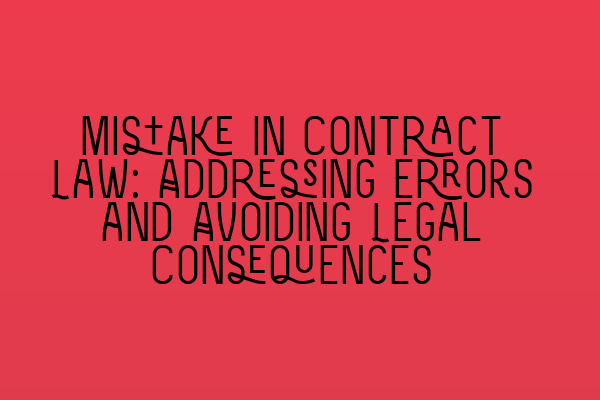Mistake in Contract Law: Addressing Errors and Avoiding Legal Consequences
In the world of contract law, mistakes can happen. Whether it’s a simple typographical error or a more significant misunderstanding, these mistakes can have legal consequences that can be both costly and time-consuming to resolve. As a solicitor specializing in contract law at SQE Contract Law, I understand the importance of addressing and avoiding mistakes to protect the rights and interests of my clients.
In this comprehensive blog post, I will explore the concept of mistake in contract law, the types of mistakes that can occur, how they can be addressed, and strategies to avoid them. By understanding the intricacies of mistake in contract law, you can navigate these issues effectively and protect your legal position.
What is a Mistake in Contract Law?
A mistake in contract law refers to an erroneous belief or understanding between parties during the formation of a contract. It can involve a misunderstanding of terms, a misrepresentation, or a failure to include important information. These mistakes can range from clerical errors, such as typographical mistakes, to more substantial misunderstandings that impact the core terms of the contract.
Types of Mistakes
There are generally three types of mistakes in contract law: unilateral mistake, mutual mistake, and common mistake.
Unilateral Mistake: A unilateral mistake occurs when one party is mistaken about a material fact in a contract, but the other party is aware of the mistake. In such cases, the mistaken party may seek remedies such as rescission or reformation of the contract.
Mutual Mistake: A mutual mistake happens when both parties are mistaken about a material fact in the contract. This type of mistake can often lead to the contract being declared void ab initio, meaning it is treated as if it never existed.
Common Mistake: A common mistake arises when both parties are mistaken about the same material fact in the contract. In these cases, the contract may be voidable, allowing the parties to rescind the agreement if they choose to do so.
Addressing Mistakes in Contract Law
When a mistake is identified in a contract, it is crucial to address it promptly and in accordance with contract law principles. Here are some steps you can take to address mistakes effectively:
1. Review the Contract: Carefully examine the terms of the contract to identify any mistakes or discrepancies. This may involve comparing the contract to any previously negotiated terms or agreements.
2. Inform the Other Party: Notify the other party of the mistake and discuss potential resolutions. Open communication is essential to resolving the issue amicably and avoiding legal disputes.
3. Seek Legal Advice: Consult with a contract law solicitor to understand your rights and options. A knowledgeable solicitor can analyze the specific circumstances of the mistake and provide guidance on the best course of action.
4. Negotiate a Solution: Work collaboratively with the other party to negotiate a mutually acceptable solution. This may involve renegotiating certain terms, rectifying the mistake, or terminating the contract, depending on the nature of the mistake and the intentions of the parties.
Strategies to Avoid Mistakes in Contract Law
While mistakes can happen, there are proactive steps you can take to minimize the likelihood of errors in contract drafting and execution. Here are some strategies to consider:
1. Clear and Precise Language: Use clear, precise, and unambiguous language when drafting contracts. Avoid using jargon or complex terminology that could lead to confusion or misinterpretation.
2. Thoroughly Review the Contract: Before finalizing a contract, thoroughly review all clauses, provisions, and terms to ensure accuracy and completeness. Consider seeking input from a contract law solicitor to identify any potential issues or areas of concern.
3. Engage in Negotiations: Actively participate in negotiations to ensure that all terms and conditions are adequately discussed and agreed upon by all parties. This can help minimize misunderstandings and ensure that everyone is on the same page.
4. Maintain Documentation: Keep detailed records of all contract negotiations, communications, and amendments. These records can serve as evidence in case of any future disputes or claims of mistake.
Final Thoughts
Mistakes in contract law can have significant consequences, which is why it’s important to address and avoid them whenever possible. By understanding the various types of mistakes, how to address them effectively, and strategies to minimize errors, you can navigate the complexities of contract law to protect your rights and interests.
At SQE Contract Law, our team of experienced solicitors can provide you with expert guidance and representation in contract law matters. Contact us today to learn more about how we can assist you in addressing and avoiding mistakes in your contracts.
Related Articles:
– SQE 1 Practice Exam Questions
– SQE 1 Practice Mocks FLK1 FLK2
– SQE 2 Preparation Courses
– SQE 1 Preparation Courses
– SRA SQE Exam Dates
